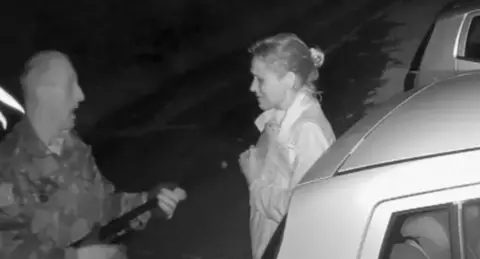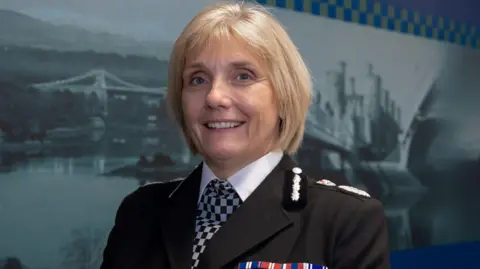 IanCooperPhotography.Com
IanCooperPhotography.ComA woman who was held at gunpoint by her ex-partner has said the ordeal was “not as awful as being stalked” as she criticised the “shockingly low” number of protection orders issued.
Rhianon Bragg, from Rhosgadfan near Caernarfon, Gwynedd was held hostage for eight hours with a shotgun in 2019.
Five Stalking Prevention Orders (SPOs) were issued by Welsh police forces in 2023, despite more than 8,000 reports being made, a BBC Wales Live investigation found.
Police said stalking was a priority and they were committed to tackling the crime.
 Rhianon Bragg
Rhianon BraggMs Bragg said she was subjected to controlling and threatening behaviour from her ex-partner Gareth Wyn Jones through most of their five-year relationship.
“I pulled up, got out of the car, and then from just in front of me, Gareth leapt out from the shadows, shotgun up at my chest,” she said.
“I screamed. It was a shock but not a surprise.”
SPOs were introduced in January 2020, just after her ordeal.
“Sometimes I think ‘would that have made a difference to me?’ But actually if here we are nearly five years later and these things still aren’t being implemented, they’re not making a difference to anybody.”
Police say the orders are just one tool in their box of ways to tackle the crime, but Ms Bragg was critical of how they have been used.
“It’s not a useful tool if you don’t pick it up and use it. It becomes a waste of space in your tool box.”
Ms Bragg said the five SPOs issued in Wales in 2023 was not enough.
“I think the bottom line is that the orders are not working and something needs to be done about that.
“Until stalking is recognised as the widespread issue it is, and until as a society we deal with it effectively. Wales is not anywhere as near as safe as it could be,” she added.
SPOs are a civil order which aim to protect victims from further harassment.
Police apply to the magistrates for an order, and if granted – it is a criminal offence to breach its terms.
A Freedom of Information request showed only five SPOs were issued in Wales in 2023, the same as in 2020 and 2021.
Television presenter Ruth Dodsworth’s ex-husband was jailed in 2021 for three years for stalking and coercive and controlling behaviour.
He was also given a restraining order against contacting Ms Dodsworth.
“Make no mistake, the fact he’s been to jail and served his time, doesn’t mean I’ve served my sentence,” she said
She said she lived her life “in fear” during her marriage and “the consequences are devastating”.
“It’s really important to hammer home the affects stalking can have on someone,” she added.
Ms Dodsworth has used her experience to raise awareness and empower others who may be in similar situations.
“By talking about it, I get messages every single day from people who are going through similar things.”
She said the number of protection orders issued was “not good enough” but positive action about the crime was “heading in the right direction”.
What action are police taking on stalking?
North Wales Police Chief Constable Amanda Blakeman said it was “absolutely critical” her force took stalking seriously.
It has worked with people like Ms Bragg to inform their training and response.
“I’m incredibly grateful to Rhianon working with the force. It’s important we don’t only look at academic work, but lived experience and learn from that,” she said.
She said the two SPOs issued by the force last year were not enough.
“Work this year has increased the amount of orders we’ve looked at this year, and my intention is to fully support victims who would benefit from them.”
The four forces in Wales said they have dedicated staff and officers to identify cases where an order may be appropriate.
This year North Wales Police appointed a stalking co-ordinator and detective sergeant alongside.
 North Wales Police
North Wales PoliceDet Sgt Sally White was appointed by North Wales Police in September.
“It’s so important to have a dedicated stalking role because first and foremost stalking can have a really devastating impact on people,” she said.
“It’s fair to say we haven’t always got it right previously so there’s plenty of work to do to address that.”
Det Sgt White said stalking was a complex crime and the signs were not always obvious.
“We’ve introduced training right across the force and a specialist risk assessment to enable all staff to ask really probing questions to identify potential cases.”
She also stressed the importance of multi-agency work by introducing stalking panels to their portfolio of work.
“Different agencies have different expertise, so we’ll bring together people like, victim support services, probation, health – and look at all tactical options, to not only stop the perpetrator behaviour but how to best tailor support to the victim.”
The Home Office has been approached for comment.



